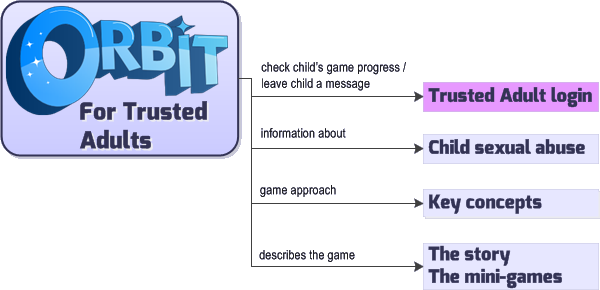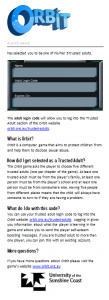For Trusted Adults
Orbit is a computer game that takes a positive and practical approach to child sexual abuse prevention; an approach that is informed by evidence-based research.
What is Orbit?

Orbit is a sexual abuse prevention program consisting of a computer game, classroom activities, website containing information for trusted adults and parents/caregivers and associated resources. The program is designed for children aged between 8 and 10. It is a free program created by the University of the Sunshine Coast with financial and in-kind support from the Telstra Foundation, Queensland Police Service, Daniel Morcombe Foundation, Sunshine Cooloola Services Against Sexual Violence Inc. and Curious Bear game development company.
Whilst Orbit is designed to be used at school, there are also sections of the Orbit website dedicated to helping adults learn more about child sexual abuse prevention, and about the key concepts raised by the program.
Your role as a trusted adult
Orbit’s foundation is the belief that healthy attachment to adults is the key to preventing and minimising the negative effects of child sexual abuse and that it is the responsibility of adults to protect children. Throughout the game, the player is asked to identify five adults from different areas of their life to be their trusted adult support network. If you have received a trusted adult slip, then you have been asked to be a part of that child’s trusted adult support network. The code written on the slip can be used to log into the trusted adult section of this website.
As part of the Orbit game, the child will make a cartoon representation of you using an avatar generator. There are sections of the game designed for side-by-side play (two people at the one computer keyboard) and the child may ask you to play some of these mini-games with them.
Research tells us that sexual abuse prevention needs to be addressed by the whole community. You can play your part by logging into the trusted adults section of this website and leaving the child a message telling them some things they are good at. Also explore this website to find out more about: the Orbit program and how it works, child sexual abuse and its prevention and the key concepts raised in Orbit. You may also like to talk to other members of the community about child sexual abuse prevention.
Note: It is possible to be a trusted adult for more than one child.
Be prepared
Through the course of this program some children may realise that they have been / are being sexually abused. Hence, you should be prepared to receive disclosures of sexual abuse. For more information on how to respond to a disclosure, visit the Disclosures section of our website. Here, you can also download a printable wallet card containing sentence prompts that you can keep with you at all times; you may also find this same wallet card on the back of your trusted adult slip. Although receiving a disclosure can be difficult and emotional for both you and the child, it is important that children have responsible adults they can turn to who can help keep them safe.
How to use this website

Orbit is based on the premise that it is the responsibility of adults to protect children. Log in to the trusted adults section of the website to see how the child is progressing within the game and leave encouraging messages for the child.
Go to the Child sexual abuse section of this website to find out more about child sexual abuse, including how to respond if a child discloses to you that they have been sexually abused. The way adults respond to a disclosure of sexual abuse can affect how well a child recovers so please take some time to familiarise yourself with this section.
Visit the Key Concepts section of the website to find about the key concepts addressed in the game. This section also provides parents/caregivers with ideas for how to have conversations with their child about these key concepts.
Go to The Story and The mini-games sections to find out what happens in a particular part of the game.
Can I trust Orbit?
The development of Orbit was informed by evidence-based research and was built in collaboration with counsellors, psychologists, social workers and educators.

